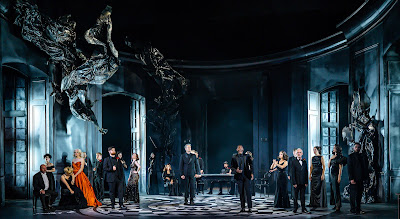The door to the circular ball room opens and every head turns as a woman wearing a striking scarlet dress walks in. Violetta is a Parisian escort – a ‘courtesan’ in polite opera parlance – and she is hosting a social soiree to celebrate her return to good health. Her current client, a possessive baron, is among a throng of darkly dressed, glamorous women and men in attendance. But when Alfredo arrives, Violetta is immediately besotted with the handsome poet who, unbeknownst to her, has been visiting her sickbed daily. His only flaw is an interfering father who is none too amused at the prospect of Violetta’s career besmirching the supposed good name of his family and throws a scurrilous spanner into the romantic works. Can Violetta’s willingness to put others first overcome the twin hurdles of patriarchal misogyny and a relapse of her life-threatening illness?
Giuseppe Verdi’s opera La Traviata is a study on class and hypocrisy. It’s countercultural for 2022, never mind 1853 when it premiered to a tough audience in Vienna. The heroine of the piece, with the greatest moral backbone, is Violetta, played with vigour by soprano Siobhan Stagg. Rarely off-stage during the four scenes, Stagg at first oozes self-assurance. Then she is coerced into breaking off her for-once loving relationship and sacrificing her own desires to placate another man’s feelings, before staging a passionate fightback against her ticking body clock to.
Whether the centre of attention at a party, or a sweating mess in bed with tuberculosis, Stagg’s Violetta demonstrates real strength of character alongside her soaring arias and balanced duets with Alfredo. If Violetta turns heads, then Alfredo is a good match; his patent shoes are just about the only shiny thing on the stage. Noah Stewart brings poise, his fabulous tenor voice, and a commanding presence and great body language in Alfredo’s scenes with Violetta. Ukrainian-born Yuriy Yurchuk gives Alfredo’s father Giorgio a sense of derision. Local baritone Seamus Brady stepped into the role of Baron Douphol with confidence and aplomb, though extra menace could be added during the run.The walls of Niall McKeever’s crucible set are distressed, the windows smudged, and what once may have been classy statues and fixtures are instead twisted and melted, hanging ominously from the wall, one with a chair impaled in its mess. Violetta’s poverty of finance and wellbeing is all around, and the muted costume choices and severe wigs amplify the sense of loss that hangs over this opera that’s truly not over until the frail lady sings.
Fifty players from the Ulster Orchestra fill the pit under the athletic baton of Rebecca Lang. Sitting in the middle of the front row provided me with an unexpected upstairs/downstairs view of the performance, watching the animated playing below stage (including some of the chorus arriving with tambourines to augment one song) at the same time as the cast hold director Cameron Menzies’ freeze-frame poses above their heads. Good to spot Clara Kerr amongst the stamping flamenco dancers that bring colour and movement after the interval before Doni Fierro struts on as the matador.La Traviata is one of the most commonly performed operas. Its plot is relatively straightforward to follow. Sung in Italian, English surtitles are visible at each side of the stage. And the gaps between acts are long enough to read ahead in the synopsis to piece together the next stage of the story. Given NI Opera’s history of risk-taking, the La Traviata feels at times to be quite subdued, lacking the brashness and shock of productions like Salome or Turandot. Playing it safe artistically will be popular with local audiences who’ll flock to the Grand Opera House to enjoy the excellence of the talent that comes together to play, act, sing and create a production of this quality. However, this approach does perhaps play down the wonderfully villainous sense of high drama and pantomime that opera can conjure up when the art form is pushed to extremes.
NI Opera’s La Traviata will be back on stage in the Grand Opera House on Tuesday 13, Thursday 15 and Saturday 17 September.
Photo credits: Philip Magowan and Neil Harrison
Enjoyed this review? Why click on the Buy Me a Tea button!



No comments:
Post a Comment